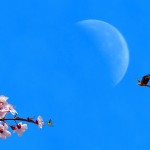We all want, desperately, to control our own lives.
Especially when we feel the most powerless, the most alienated, the most alone.
It’s a natural, human response.
And, really, what’s so wrong with exercising our God-given free will to stake our ground?
Or to choose our own path?
Or to decide, ultimately, what’s best for us?
Perhaps nothing at all.
Except that it never seems quite enough, does it?
It never completely fills the gaps in our lives.
Or closes the hole in our hearts.
It never truly feels free.
No matter how much influence we may exert, no matter how much control we bring to bear, our lives are always entangled with some other – that is, with other people or events throughout our lives which always abide with us, which always exist all around us.
And this is so whether these deliver to us good or ill, whether they elicit from within us joy or pain.
These others, necessarily, affect us.
And we, just as necessarily, affect them.
As if we are but a single organism with one breath, one heart, one spirit.
There is always a larger picture to be observed and framed.
So there are times when our perceived freedom is actually the most constricted – it is circumscribed by our egos, bounded by our mortal limits, defined by our selfishness.
Sometimes our free will is simply insufficient to make any difference at all. After all, as Thomas Merton has observed, we don’t even have much control over our own bodies.
In Merton’s book, No Man Is An Island, he noted, in fact, that our continuing efforts to do so – that is, to advance, solely, our own egos – might only serve to deliver us straight to the doorstep of hell:
To consider persons and events and situations only in the light of their effect upon myself is to live on the doorstep of hell.
Selfishness is doomed to frustration, centered as it is upon a lie.
To live exclusively for myself, I must make all things bend themselves to my will as if I were a god.
But this is impossible.
Is there any more cogent indication of my creaturehood than the insufficiency of my own will?
For I cannot make the universe obey me.
I cannot make other people conform to my own whims and fancies.
I cannot make even my own body obey me.
When I give it pleasure, it deceives my expectation and makes me suffer pain.
When I give myself what I conceive to be freedom, I deceive myself and find that I am the prisoner of my own blindness and selfishness and insufficiency.
I hope that you can take just a few minutes today to think about Merton’s words, and examine how you might best be able to explore, and then integrate, your own legitimate desires within this larger picture of your life.
And try not to fall prisoner to your own insufficiency and ego.
At least not today.
Peace
Image Credit: Pixabay.com
















